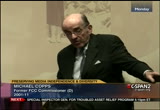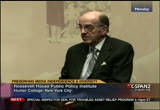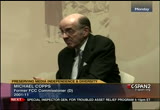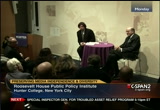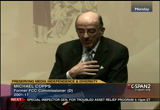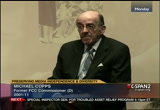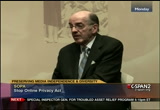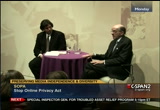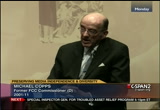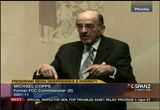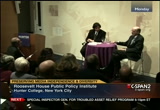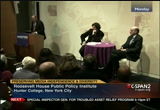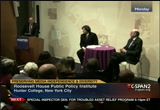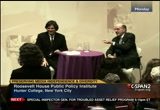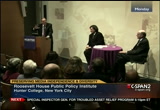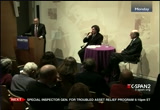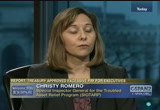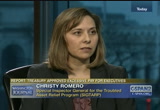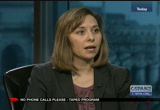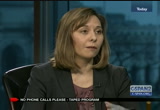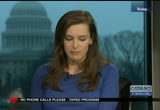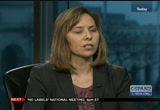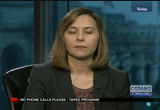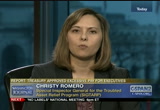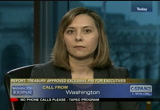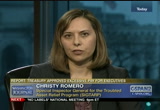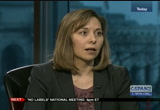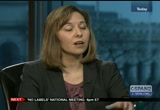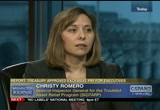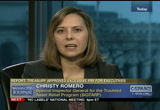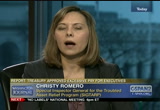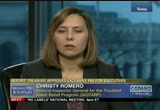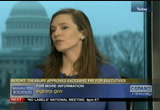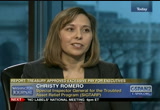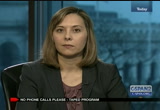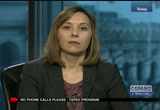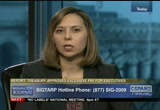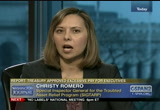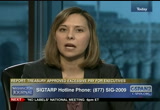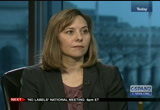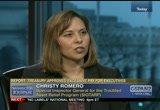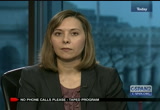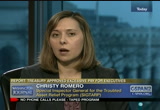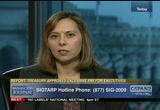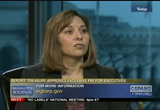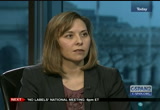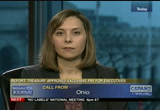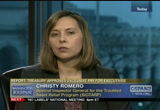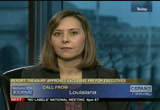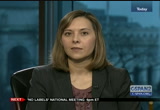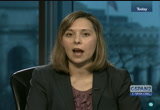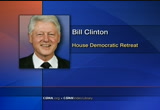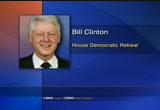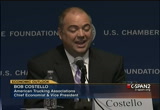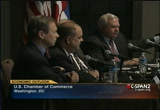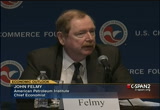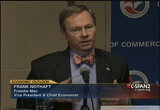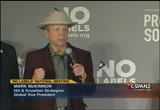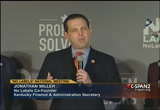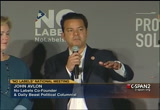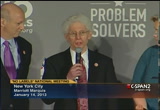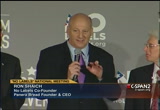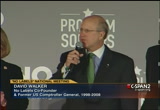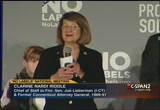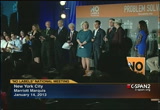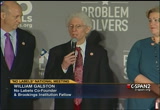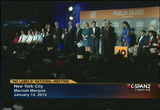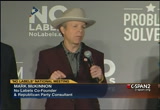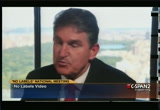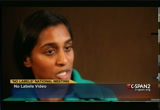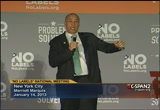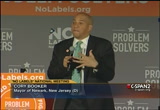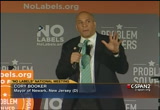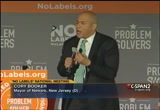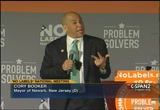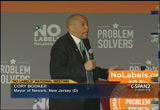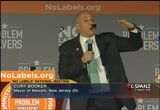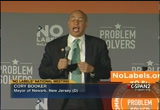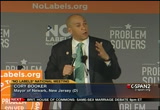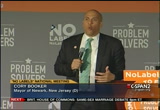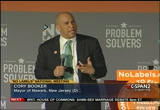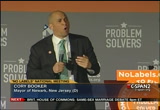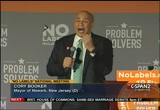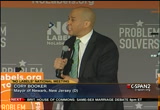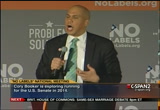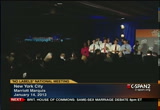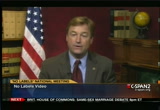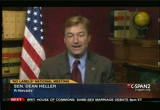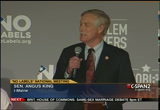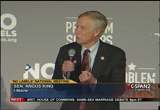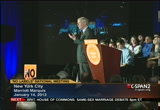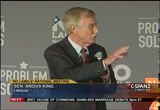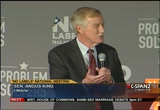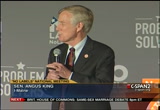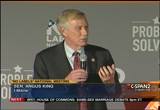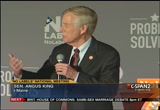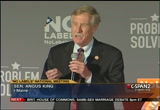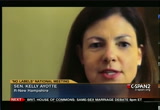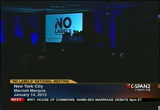tv U.S. Senate CSPAN February 8, 2013 5:00pm-7:00pm EST
5:00 pm
5:01 pm
that went into karl rove's. and they didn't even take it. is that just politics or is that the power of the money and what superpacs is overrated? >> no it is not overrated. i was concerned a lot of reform groups saying the diversity spoke and i think diversity did speak in the election but this proves the money doesn't count that couldn't be further from the truth and money is first of all financing those campaign ads but ultimately it is about access. those checks are being cash right now to writing not just in congress but in the state legislatures from the country.
5:02 pm
that money is acted already and in 2014 we already know the money is going to be back in the screen to be smarter. in a situation that will be backed only it will be smarter next time. yes? >> my name is louis and i have a background in media on the business side and this is another perspective. having worked all the way to the "washington post," we have had to that advertising repeatedly sending it to the lawyer for them to go to the copy making sure it is done properly why don't the broadcast companies have to do the same thing? >> it's a rather unlikely study
5:03 pm
that came out at the time of the electioneering and went into areas that was saturation and went in and analyzed how much time the local news gets to talking about who sponsored those absent. it's almost nothing. almost nothing, so journalism doesn't work there to implement so i think there has to be some expectation to do that and that gets kind of back to the expectations when you get that license away to cover the local campaigns and politics. but if you are going to get that license for eight years or five years why don't we say now when we know that the problem is news
5:04 pm
there is a guideline there among the other guidelines compared to when you get your license order you putting into rate? we did that with our bdy become marginal success by the argue with the children's program it is better than the radar and they start paying little attention even though they found ways to run it and diminishment. now the problem i think is that the guidelines are news centric and find an isolated way to do that but it is constant with the first amendment of the constitution and the united states and with of the needs of the united states of america and the people don't know what is going on and a student at hunter
5:05 pm
college and and you have spoken a lot this evening about opening up to the public i was wondering why you haven't spoken about sopa which the movement against that was a grass-roots movement and a lot of public action out of the surgeon web sites and i was curious why you thought of aaron schwartz and his recent death. >> been hidden. it is a wonderful example that gets into the copyright and all that and there was a good example of how the internet can react very quickly and it took about 3 million people back in 2003 so i would agree with you that that does define but the
5:06 pm
grassroots can do and that's the jurisdiction of the federal communications that i think copyright buy really serious issues to the country and a lot of the rights to the cultural and historic treasure trove tied up with very few companies and the congress seems to extend the length of the copyright to 75 years after or something like that and it doesn't seem especially in tune with a really wonderful opportunity to share creativity and of the rest.
5:07 pm
>> i am just a listener. it seems that most of the news coming to the television set is cable news and network news which is coming is becoming increasingly irrelevant. can anything be done to alter the standards because that is where most of the transition occurs. >> i don't think the source is producing much of an array of the substantive news that i'm talking about. it's entertainment and it's up to the media to interest the public and the public interest. there is a responsibility to do that. and we don't get it. so i like to watch the evening news. my wife and i watch it almost every night and you know going
5:08 pm
in your not going to be informed about what's going on the world in tonight's headlines at all these things, entertainment, celebrity stuff, dog shows and what have you. so yes, it can be done and goes back to the guidelines as a condition of your license. again, not dictating content, but finding ways, finding business models and there is no business model to support that some may be the newspapers need to be looking more at the nonprofits. maybe we need more support for the public media. the united states of america thinks fans a dollar and 46 cents per capita per year. everybody in this room says a dollar 46 cents, 64, whether it was. this year. the countries in europe which are very space on the government
5:09 pm
controlled media is 50, 100, 250, and some of that goes into supporting the news, the deduction of news and to journalism. so we've got to start looking at some options. i still think that the market can accommodate what i'm talking about. i'm thinking they can afford to produce the condition of the comcast the nbc you merger a couple years ago when the folks from comcast can to see me and put forward some conditions that i didn't accept and i said why don't you do something and that is the company that they have
5:10 pm
the time. >> i think it is a condition of licence which is not a license to print money. it's still pretty lucrative and it is a condition that they will find that some assemblies and other options that were just discussed. >> i think we have time for one more. i will let you choose. >> i will go first. >> also thanks for the excellent presentation. i must admit that i wasn't informed myself and i don't think that people are informed and the problem is that the means by which the people can be
5:11 pm
informed and by which we can be more experienced parenting is up to the media and those are the people that are dragging their feet, so we are kind of working against ourselves. i think one possible solution might be in your hands. with a documentary films. when there was the sexual abuse in the military of women and leon panetta thought today's leader there are radical changes and things done for women of the military and a could have been done years ago so it really was marvelous, and then the documentary, great what they did for nutrition. so we should do is have a documentary but don't leave that to the media to present it to
5:12 pm
the people and make it transparent to the public, right? minn get free. make it that way and make it known and make not just one but a series of documentaries. >> when i was pressing for the side of the syllabus and now an assignment. >> i am doing to you what you said 50 years ago they did to the newspaper people. go out and do it. take as long as you have to be this and i have a whole series of questions i didn't get to ask what may be in a documentary. and you already have a microphone. >> but a series of documentaries. >> let me add one other thing and it's a belated idea and i think as much as what you said. how about if we have network television set aside in prime
5:13 pm
time 25% has to be done by an independent producer so that you're not producing your own stuff, you're wrong homogenized programming we would have a helluva time 25% now because of the independent said ronald overseas were out of business that if that was a condition of licence he would see that creative community come back and independent programming. you see more diversity of sources. islamic to get off the ground should be something like occupy a wall street because this is that important as you said at the beginning. >> a really good conversation here tonight, glad that had these three parts of stirring the opening talks for i would call the practical and enlightening conversation and a
5:14 pm
wonderful dialogue here with the audience. andrew and michael, thank you very much. [applause] and i think you put a good question to us earlier and asked each of us. ask yourself what issues do you really care about and is that issue getting enough attention and if it is not, then you need to join the promises to keep campaign because i think you so eloquently said it is within our grasp to do something about this challenge. so you have put it to us and i have confidence that this audience to will respond. thank you for coming. [applause]
5:16 pm
noncom inlet at oversight of the troubled assets release program known as t.a.r.p.. this washington journal segment from earlier today is about 40 minutes. >> host: special inspector general to the troubled assets relief program. the troubled assets relief program, we've heard of it before but what is sigtarp? >> guest: we are the watchdog over the bailout. so when congress made the bailout, we wanted a very independent watchdog so first and foremost we are a, law enforcement agency, as we investigate crime related to the bailout but then we also watch all of the dollars coming dollars in and out and we try to
5:17 pm
bring transparency and oversight to this. so that is what we are doing. we are being a watchdog. >> and special inspector general to the troubled assets relief program, i came out with a report recently that looks that executive pay for the companies that took the bailout dollars. here's some headlines "the washington post" says treasury approved excessive pay for the executives that bailed out aig, and others. they say the watchdog groups excessive pay in the headline in politico so this is basic so you are not going to be able to your top executives the same as you would pay the bailout. the company received exceptional bailouts. this is aig bank of america, citigroup, the car companies, gm and chrysler and the auto
5:18 pm
finance company for those companies the treasury actually has a pay czar, official title the pay master for each of the top 20 employees of the company for each year so we reported last year looking at the pay for 2009 and 2011 and we said that the treasury didn't fail to rein in excess of pay and a word of the multi million dollar pay packages to these companies. so for 2,012th we continued the work and they awarded the pay packages but they've actually gotten worse. sinecures that report and if you would like to join the conversation, republicans, 285381, democrats, (202)585-3000, independent, (202)585-3882. who is responsible for that? >> guest: treasury is ultimately responsible. to set guidelines touches of the packages when they rolled them back dhaka about the guidelines for just a little it.
5:19 pm
they told us he told sigtarp to pay back t.a.r.p. they always wanted to make sure the employers have scan in the game and the performance was ultimately titans excess of the company so how she balanced those competing principles is he came up with guidelines, he came up with three guidelines and they were supposed to balance these principles. so the first guideline the salary should rarely be over 500,000 recognizing that is what these companies were bailed out and the third is part of that pay needs to be tied for a performance goal but isn't leader in the future that has to be earned. so those are the guidelines that
5:20 pm
were ultimately rolled back. >> host: you talk about kenneth feinberg. what kind of dollars are we talking about? you talk about the guidelines were but when we actually see the pay, the salaries and bonuses come through what are the numbers? >> guest: they are astounding. by the treasury standards they are excessive. so first of all we talk about the top 25 people of the country store left, that is aig, gm financed cars and also did the subprime mortgages. so let's talk about the numbers. basically it is a million dollars. if you work for of those companies and you are one of the top 25 employees the treasury awarded $1 million. if you worked at aig it is $2 million. but that is really the floor. so, most got well above that. more than half of these executives of the treasury approved pay for $3 million or more. 16 dhaka $5 million or more.
5:21 pm
the pay adds up to $100 million. above $100 million. then you have to look at the cash salaries, which went through the roof. so all of a sudden they would rarely be over 500,000. 70% of the employees got treasury approved cash salaries of 500,000 or more. sure enough when you look at the cut off line for under $50,000 in cash. the pay raises removal long-term pay that was tied to meeting some sort of performance measures. >> host: ms. romero talking about the report from sigtarp, special general for the troubled assets relief program. here's a special excerpt from that pay package worth $3 million or more, with 54% of the 69 top 25 employees with 16
5:22 pm
pay packages worth at least $5 million. the front page of this report says treasury continues excessive pay for the top executives. what next? >> guest: last year we made a series of recommendations and we said the treasury put in some guidelines, put in some criteria. when is it appropriate for someone to be paid $500,000 in the cash dollars or more? they didn't do that. they didn't make any meaningful reform and so we are saying it again. and really, we have to bring attention to this. we have to bring attention to the american people who funded these companies in the bailout. there is a fundamental fairness issue as people are struggling, and you have the average income of americans who find the bailout at $50,000. when you look at a gm employee who gets a $50,000 raise because gm wants to do a little
5:23 pm
something extra is what is the explanation. americans that fund the bailout need to know that. we are going to continue to push for change of only at the companies that are less than t.a.r.p., general motors and the allied, but ultimately it should shed a light on how financial crisis was in part driven by excess of pay that lead to excessive risk and that is the bigger picture that has to be looked at. when you look at a company like aig that is now repaid t.a.r.p., treasury is no longer going to see the package. but is aig going to return to the past practices having paid that lead to excessive risk and if it's up to the federal reserve that now regulates aig to make sure that doesn't happen. >> host: be here from arkansas and paul minnesota. democrats line. good morning. >> caller: good morning. the question that i have is the head of the treasury is always from goldman sachs; does that have a lot to do with it, like
5:24 pm
the good old buddy system? >> guest: caller raises an interesting question how the treasury treated some of these larger institutions. secretary geithner who just left the treasury department did not actually come from goldman sachs, but he was a federal bank of new york before he was treasury secretary. but it does raise an important issue because throughout the history of the bailout and others in a different treatment for the large institutions than there have been for the smaller institutions putting it and that is a critical, of critical importance. and one example of that is all of the energy that went into getting the larger institutions out of t.a.r.p. while forgetting about almost the hundreds of smaller banks that were in t.a.r.p., and there are still nearly 300 million small institutions, and so as well as the struggling homeowners who need assistance, and so we have been trying to remind people
5:25 pm
don't give up on the people better still feeling the effect of the financial crisis. and that is what is critically important. >> host: battleground in washington, hello. >> caller: good morning. i've been following this fairly closely for the last five years. i have noticed brian lamb has had some interesting interviews and i have seen sheila bair from the fdic and i think on bill moyers at one point, but i think that the biggest point everybody seems to be missing is it's not whether or not people are receiving bonuses for who is paid back how much of t.a.r.p., who cares so much the feedback but the big point everyone seems to be missing is the glaring contradiction for the 70's, 80's and 90's as factory workers lost their jobs and small farmers we
5:26 pm
were receiving a lectures about the free market, about free-market capitalism, but the free market capitalism and the free trade agreements, all this stuff wiping out america's middle class that was all because we had to bowed down to the religion of the free market and what can never be repaid regarding t.a.r.p. is the contradiction, the double standard that when the plutocrats got into trouble, all of that garbage about the free market milton friedman and all that stuff got thrown a right out the window and said it is the double standard. it's the hypocrisy, the contradiction that can never be repaid. thanks. >> guest: let me talk about that because the caller raises an interesting point and this is something i've put a report out this past week. one of the things we learned in 2008 is that our financial system was very vulnerable to these highly interconnected financial institutions, these
5:27 pm
too big to fail companies. not only were the highly interconnected with each other, but what they learned is that their failure actually threatened american jobs and american pensions and american mortgages and that was shocking. i don't think that the regulators were prepared to deal with that and so even with the bailout coming at preventing the failure of some of the institutions, there were trillions of dollars in america and the was a root cause of the financial system that hasn't yet been addressed. that is one of the things that needs to be addressed and the other thing that needs to be addressed is the risk management practices the were woefully inadequate at the same companies. those are two things that ultimately to be addressed because we can look at where we are on the bailout and how much has been paid back the the bigger question is how do we get to the bailout and are we -- do we have a financial system that is more stable, that is less prone to a crisis and that is the real question.
5:28 pm
>> host: we've been talking about the numbers yet let's take a look at the bailout and was paid back but. this is a graphic from npr showing how much they got and you can see the banks and financial services to who but you see fannie mae and freddie mac, aig auto companies and others in the visual comparison. "the washington post" reports the feedback the 182 billion that it receives and gm goes over 21 billion then allied 11 billion. >> guest: the ottilie 014 billion. this is a lot of money. so, for that we know 74% of the company, 22% of the general motors. so there is still a large institution. but the everything that i was talking about earlier is the nearly 300 small institutions the were left and the numbers may be small, but those are institutions that cannot get out. there have antril. the smaller banks that serve communities, i mean, they're still having trouble, they still need assistance and was never
5:29 pm
supposed to be about bailing out the larger institutions. it's supposed to be helping everyone employing the homeowners and that money isn't going out the door sufficiently. >> host: christy romero special general for t.a.r.p.. why is no one in jail? where in t.a.r.p. does it say pay executive bonuses? she says it is misappropriation of funds. >> guest: i think that the caller, excuse me, the tweeter is raising a point that a lot of americans feel very strongly about and americans are looking for justice and accountability. we are a criminal law enforcement agency, and so we do investigate crime related to t.a.r.p. and our investigations have resulted in criminal charges against 121 people. and criminal charges are not evidence of guilt but they are charges that have to be seriously dealt with. but as of december 31st, excuse
5:30 pm
me, january, 83 people had already been convicted. 35 had already been sentenced to prison and so we are awaiting trial and prison sentences and more people will be going to jail and will continue to be looking at this and trying to bring accountability. now, our jurisdiction is not as broad as the entire department of justice related, but we will continue to do our best and the department of justice is our partner. we are investigative agencies. >> host: new york independent line, welcome. >> caller: good morning. thank you for taking my call. who is responsible for these large payouts to the company? they were in trouble with reagan
5:31 pm
but she wasn't handed the money and he came out on top. ford managed to stay on top. why didn't we bailout chrysler and gm? this is what i do not understand. and the gentleman that you showed a picture of, i think feinberg or something, the gentleman that was making -- he wasn't the secretary-treasurer but he was in the treasury department. isn't he the same one that had the funds that were supposed to go to the victims of 9/11 and they never got paid but it went to all of these other various programs like all these other things? >> guest: there were a lot of questions there. let me see if i can address -- i
5:32 pm
think you raised this earlier, who is responsible and how does this stop and i think for our report that is one of the critical pieces here. first, the companies have got to stop demanding excessive pay. if you bailout you have to stop pressing against the pay limits and have to have an appreciation for the situation that you are in and the fact that you are bailed out by people who don't have extras right now who are on tight budgets and that hasn't happened and they want to raises and higher salaries. they don't want to have their pay meeting any performance goals and that has to stop because ultimately they propose pay for their top employees to leave so they have to stop proposing extensive pay. the fact of the matter is we've grown to expect that in these companies and that is sad to say. treasury is supposed to be the one that stands up for the taxpayers and holds the line on excessive pay and that isn't happening. and that is where it has to
5:33 pm
stop. the treasury has to follow its own guidelines. it can't just close back. so what we are finding is that the companies are pushing back on the treasury that they are really not finding it resistant. the treasury is allowing that to happen and what happens is the treasury since the pay largely driven by the company's proposal. so what we have said is the treasury, you have got to independently began to each of these. there is only to companies at this point. general motors. so we're talking the top 25 for each one. did in and see is that pay appropriate, and i don't mean is it appropriate based on what they were paid before the bailout. what i mean is is inappropriate for the taxpayer company? is that an appropriate pay? why are these people getting raises that went from $30,000 to $1 million? one person got a
5:34 pm
1 million-dollar raise comes of the company proposed 18 raises, the treasury gave 18 and only four of those were under 100,000. but you see a blanket number this person gets $100,000 you have to wonder? why is that person getting a $100,000 raise and the others are getting more? how is it that their services are so valuable that it's worth that much? what we said to the treasury how do you justify this and what we got explanations that parent of the companies said, and we have to independently dig into each one of these and you have to decide what is the amount? you can't just let the company's drive the pay packages. >> host: here is a letter from the new defending the action of the treasury department and the office of the special master as it is called, and it cites the
5:35 pm
percentile of what other executives get. so wanting to be competitive and wanting to be in the zone of all the other companies received. is that fair? >> guest: but that is only one part. you need to keep them competitive but you want to make them so uncomfortable they don't have an incentive to get out. and look, we also have to look at these companies. these are the companies that are left after four years while the other companies have gotten out. so you can't really compare it to a company that isn't being funded by taxpayers. one of the things the was in the report is the new would be utterly normal for the top executives to be paid cash salaries over 500,000. the response to that is maybe if they were not in a bailout. >> host: how does one get that job? >> guest: the treasury appoints them and they have a lot of power and they set the
5:36 pm
pace, so that azar has a lot of power and has to balance that and the way that kenneth feinberg determined was the keeping them competitive while the getting yet not too comfortable to be in t.a.r.p. to use these guidelines that using these guidelines would strike that balance. but rolling back the guidelines it goes all towards what the companies are asking for. >> host: talking about the report from the treasury continued and success of patriot firmly infield pennsylvania hello. >> caller: as i've been listening to this interesting problem. the screening process that we used to hire people in treasury is doing a remarkable job for removing the morals and integrity and i can understand how people reached the upper
5:37 pm
echelons of power and all of a sudden have the moral compass is phlebotomized and they don't think everything is wrong with that. in your reporting have you gotten any insight to these situations and how people can just be so crass? >> guest: i think the caller raises an important point that we have addressed in the report. in a report last year and this year. what we reported on is these companies in proposing excessive pay and the high cash salaries, multimillion-dollar pay packages. the cash salaries that are extremely high, they just lack a complete appreciation for the situation that they are in. they want to be treated as business as usual. it's not a business as usual, not as long as the taxpayers are funding you and that is a fundamental premise that seems to be missing at these companies.
5:38 pm
these companies continue to push back. gm actually went to the treasury secretary and said please give us relief from these payments. but at the same time they are not offering to pay back the tax payers. and so it is an important point to say the companies have got to understand the situation. they cannot be paid as if they are standing on their own 2 feet, and i to be part of the problem is that a lot of these companies want there to be no public memory of the bailout. they want people to say yes that happens but now it's over and we've moved on and everything is well that everything is not well in america. we are still recovering slowly and we are still covering these companies and still continuing to put them on our shoulder and so it is not business as usual. >> host: ms. romero, you mentioned to fold, the treasury is signing off on the executive pay which sigtarp has called excessive and also the
5:39 pm
responsibility of the companies. why should the company's not ask for more money? why should they ask for less? to play the devil's advocate the ask, the treasury denies. >> guest: at some point they have to take responsibility and realize they came to the government and said they loved bacon so if you come to the government you need to appreciate who is bailing you out and the situation that americans are in right now and our economic recovery has been slow you have to take that into account and you cannot continue to push them more and more and more, so we need to see some appreciation on behalf of these companies. they're certainly is this free market system as the caller raised but this isn't a free market if you are being bailed out. you are in a special situation.
5:40 pm
>> host: peter joins us, republican. good morning. >> caller: this is a very complicated subject, but i know that you have had gretchen more dense than on not long ago on the reckless endangerment. the issue to me is the executive pay because whenever they want to pay their people understand they are on the public about the real problem is what caused this. i'm not going to make this too long but right now the justice department is suing the s&p $500 because the way the rated the securities that they really haven't done anything to address the situation because back in the 60's if you were buying a security or bond, you'd pay to have a rate and then later on they would switch that around and the people that were selling the security, so if i don't get a good rating for somebody i will go to a competitor so that as part of the problem that was not addressed in the fact the
5:41 pm
clinton administration and the bush administration they did nothing to rein in the fannie and freddie which mr. bush could have done with his secretary and reduce the mandates from over 60% that they wanted subprimal mortgages. this is what caused the collapse and right now fannie and freddie are making it more difficult to get a mortgage but they are going through the fha. the part of the problem is not that we don't have enough regulation or whatever, it's that we don't have good regulation. we don't have people enforcing those regulations. >> guest: peter raises a lot of interesting points and you have to keep coming back to the cause of the financial crisis. you are right the agency certainly played a part in the
5:42 pm
financial crisis and the subprime mortgages played a part. one of the parts the was played in the financial crisis was excessive pay. it was paid that was encouraging the companies to take risk and that is why it is important for us to do the reports that we did. i will give you a perfect example. you had loan officers at the banks who were being paid bonuses and pay based on how many loans they created. not whether those were good loans, not whether -- not taking into account whether they would later default and caused significant losses and so there's a number of different causes and the financial crisis. we have tried to bring a lot of transparency to that and try to report on that and we are doing a lot of work in this area to say well, what happened and you are right fannie and freddie isn't dealt with under dodd-frank. let's talk about dodd-frank for
5:43 pm
just a moment. we are having some reform to the financial system, but their needs to be significantly more. one thing about dodd-frank is it sets up a framework but not all of those are implemented and there are important standards that need to be set by the regulators and by treasury because what we are worried about is trying to protect americans in the event of another financial crisis, another potential bailout. we don't want to be in a situation where these companies can bring down all of these losses in american jobs and mortgages. we can't be in one of those situations again so we are going to continue to raise the alarm and say that there has to be more work done and it's not going to be easy and there is a lot of heavy lobbying. one of the things that is quite disgusting as we have all these companies that take the bailout dollars and then they turn
5:44 pm
around and they repaid the treasury and then what they do is they put all this money into lobbying against reform. they want to go back to business as usual and we can't have that. so it is going to take a lot of courage and a lot of skill and results from the treasury and the federal regulators to get back into a better situation and part of the framework is there a lot more needs to be done and some of that is that interconnectedness that i talked about earlier. you can have as a region where they are too interconnected to fail. risk management at the company's has got to improve in this situation where a lot of the companies didn't even understand the risk that they had related to the subprimal mortgages for example, or i will give you another example that shows that it continues today. jpmorgan comedies or all the situations the companies didn't even understand the risk alone manage it, and so that has got to change. and regulators have to supervise that in order to protect all of us. >> the caller mentioned gretchen
5:45 pm
morgans in from the new york times. you can find this on the web site, c-span.org on the video library. our guest christy romero is the attorney general for the sigtarp. she has had prior roles at sigtarp including deputy special inspector general and the chief of staff and also the u.s. securities and exchange commission where she served as counsel to the chairman and christopher cox and the attorney at the division where she investigated the financial fraud and insider trading and other violations of the security walls where she spent time as a litigator and clerking. we are talking about sigtarp, the special inspector general for t.a.r.p.. the treasury continues improving excessive pay for the top executives. maverick writes on twitter and says it seems a lot of these issues could have been negated
5:46 pm
or negotiated before the bailout was approved. is that -- >> that's interesting. one of the things the we constantly report is finance that could have been done better. you have to respect that a lot of the decisions were made with a sense of urgency. but the compensation decisions were not. there was plenty of time to set up a good system for that and even for the decisions that were made in the rush it is important that we point out how things could have gone better because let's say that we get in a situation, and we hope not but we get into a situation where there is another crisis and the treasury and the regulators are running around a sense of urgency and trying to fix things ultimately you have to look what happened last time but you also have to look at the record and say what could have been done better serve the of the two books to go by so they can make better decisions and we don't end up repeating the mistakes of
5:47 pm
the past. >> host: >> caller: good morning and thank you for your work. even mentioning general motors and chrysler and i know this because i have worked in the auto industry and i have relatives that work in the auto industry that a private equity firm out of new york, the owned chrysler before and right after the financial collapse. they are not involved now what are you looking at the compensation of people that had to do with them? also mentioned about standard and poor's and the reason that they got 51% of gmac, the moneymaking part, standard and
5:48 pm
poor's gave them the junk bond status of around 2,005 and that kind of letter to the chain of events that they got ahold of them and they were run by people from both bush and administration as investors and managers so i think you should also be looking at them as well. thank you. >> guest: i think he raises an excellent point. these were complicated and when you look at the bailout and what can now you have to look at the structure and the ownership structure that happened when the government forces restructuring and as a result of that the new owners come out and they were one of those. as far as compensation, that doesn't fall under the treasury purview it is just the top 25 employees at the top companies themselves by you raise an
5:49 pm
interesting point and one thing i want to raise and make clear is we are conducting audits, reviews, investigations on anything related to t.a.r.p. and i want to just throw out a hot line of information because what we have is a long in the public can call and give information they think we should be looking at, any information they know and often the public knows more we don't know and maybe you know someone in the industry or worked in one of these industries and have informations i want to give the hot line information because it is very, very critical to the way we operate. so, it is www.sigtarp.gov but there's also a telephone line which is 877-sig-2009, which is the year that we made the hot line. we had some extraordinary calls come into the hot line and we've been able to do fantastic were
5:50 pm
writing on behalf of the people who've given us information. >> host: what are people calling about? >> guest: a lot result in issues of housing. really the housing programs have had a lot of problems. a lot of frustration with people who cannot get the help they need. so, some of those have led to investigations. let me give you one example. there are con artists out there right now that call up the struggling homeowners and say don't pay your mortgage and don't talk to your lender and i will guarantee that if you pay me i will make sure that you get your mortgage payment will word through the housing program that is called hampshire or sometimes they will call with the obama plan. they will say i'm an expert in this or they may even say they are affiliated in the program so what is not happening is they take people's money and then they skipped town. what we do is catch them, put handcuffs on them and put them in jail, make them stand trial
5:51 pm
and pay for their crimes and these people are being convicted and going to jail. this is unscrupulous to have a crime targeting people who are struggling during this financial crisis so sometimes we get calls related to those and we are trying to educate the homeowners about that so they don't become a victim in the first place but a lot of people lose their homes in this situation. >> host: inspector general for t.a.r.p.. we have a question about the teeth that you cannot this enforcement. ken 877-sig-2009 fired the pay czar? getting back to the executive pay of the treasury signs of, what can sigtarp do? >> guest: we make recommendations and those have to be dealt with. we also report to congress so we send these reports to congress and they helped to put it in their but we have a number of recommendations that are not implemented and the need to be
5:52 pm
implemented and this is one example that shows how bad it can be if treasury does not implement the recommendations and so i am looking forward to a new secretary of treasury coming in to talk about our unimplemented recommendations and changes that can be made, and we will not give up. we are going to look at 2013 and we are not going to stop because ultimately we are here to protect taxpayers. that is our job. >> host: democrats line. hello. >> caller: hello. how are you. i was calling -- my question was about the t.a.r.p. situation. these people but are being investigated for t.a.r.p., i think these people -- because the american people don't really know who these people are and i think they should be some type of publishment or something so the american people can see this on a monthly basis and kind of
5:53 pm
get the feeling and a narrowing of who these people are to i think also it might work as a streamlined to imprisoned these people and have them pay for their part. those were my two questions. i just want to thank you for the time. >> guest: you raise a good point we want to get a word out on the law enforcement side we put press releases out every time we have an arrest or criminal charges or conviction or prison sentence on the web site, www.sigtarp.gov, and i hope you will continue to follow what we do. we will continue to get the word out and look at this. you raise an interesting point bringing money back and that is something i want to raise. not only does our investigation result in prison sentences or the other serious repercussions
5:54 pm
but also we bring money back in terms of court orders for the return of money to the victims are the government to get so far, we have been able as a result of the investigation to get orders from the court for more than $4 billion to come back and that is our way of earning our peace and making sure that there is accountability because there can be accountable in the prison sentence but they have to pay the money back when they read of the government or struggling homeowners or others their needs to be accountability in the dollar's. >> host: charleston louisiana, a republican. where are you calling from? >> guest: >> caller: boesh terse city across and shreveport louisiana. this lady that's on your show, what a breath of fresh air chongging to do right for us folks out here. god bless you. okay.
5:55 pm
my point is you've got to bear with me. christopher dodd was walking down the hallway on c-span cameras. they captured him saying this: why aren't you going to run for senate and his words were country why isn't going to let me. senator dodd and senator conrad both got some kind of loans through countrywide. senator conrad just retired and he didn't run for the senate. now those were his words. c-span has it on camera pity and i want to know if you have investigated them in any way. and thank god for c-span. >> host: thanks, charles. >> caller: let me >> guest: let me plant to things. we are working for everyone. if you ask me who i represent, i represent you.
5:56 pm
i represent everyone. because we all pay for this bailout and we are continuing to pay for the bailout. so i appreciate that. as to what we are investigating i have to be sensitive to the i will try to give as much transparency as i can. but i have federal agents and federal investigators working for me. because these are criminal investigations, we have to be very, very careful what we say. in terms of who we are investigating and why we are investigating. and a part of that relates to the safety of our own agents. you can understand if i find the federal agents to arrest them i need to ensure their safety. so for that i can't really talk about exactly what we are investigating. but here is what i am going to recommend to you. one of the things that in the earlier call was raised one of the things you can start to track who we are investigating where there's been something public like a criminal charge, and the rest, someone that has been convicted and is going to jail and we put out press
5:57 pm
releases and i will encourage you to go to the web site, www.sigtarp.gov and you can sign up to receive the press releases. and so you can see each time we do this. and like we said 120 people have been charged as a result of the investigation. >> host: last call independent wisconsin. >> caller: good morning from plymouth, the wonderful heartland. i think it is disgusting what they do but i wonder where they could get that idea. de representative a taxpayer off for hundreds of millions of dollars with impunity. try the united states senate. 1400 days without passing a budget yet it is mandated until all that harry reid and his pals are supposed to pass one every year. who's doing the investigation for that? was to before we let you go what do you think of this report sigtarp put out looking that
5:58 pm
executive pay of bail out companies? >> caller: of course it's disgusting. the senate gets paid for doing nothing. i wonder where they get that idea from. >> guest: you raise an important point. anyone who tries to rip off and to crime to the american taxpayers it is just reprehensible and it's not going to be dealt with and so we are coming out very aggressive on anyone in that situation and those who may be thinking about that or doing that now should take a warning from the fact that we are sending people to jail. >> host: christy romero is the special general for sigtarp. thanks so much for coming. >> guest: thank you. among the issues they discussed, job creation, immigration and gun-control. here is a portion of his remarks
5:59 pm
>> it's important not to give up on anybody. the worst that can happen is people say we are not crazy. all these people say you're trying to end the right to the second amendment and all that. then maybe they'll listen to you on the four things really do agree with you. but they cannot hear those things they agree with you on. they don't even know where you are on the issue whatever it is in this case i'm talking about guns. ..
6:00 pm
here's a brief look at that. >> we have a state of the union coming up next week. what in your area would you wish for, you know, what would surprise you, and what do you expect? i'll start with bob in the middle and we'll work to the extremes. >> boy, that would be -- one of the things that trekking has been struggling with for a number of years and of course, the chamber has been a great partner with us and so far on the issue. we're not investing enough on the infrastructure. that's good government spending. it creates a lot of jobs and product ninth the long run. you have an industry here. how many industries do this. you have an industry saying for years saying please tax me more. we want the fuels tax to go up.
6:01 pm
and so we would love to see some progress made on this. we have so desperate in the area, we are talking about perhaps there needs -- because politicians ceabtd make a decision on this and haven't since the early '90s on the federal level, maybe we need to go to indexing of the fuel tax. >> you're talking about a fuel tax for infrastructure. not fuel tax to pay for subsidizes, right? [laughter] >> that's the problem. maybe we need more infrastructure and that is a public good and that needs to be paid for in generally with, you know, tax revenue. i don't think anybody, you know, is faulting that. i think the sold we need higher fuels tax and we can use that to reduce the deficit or for something else. the fuels tax was designed or intended whether it's done so successfully or not. was intended to pay for infrastructure. that's what we're talking about. >> absolutely.
6:02 pm
yeah. we're not happy about that. >> what are you hoping for next week? >> for some reason, i haven't been consulted on that. [laughter] the president in the campaign said he was for an all of the above energy policy. andlet have announcements that support that. let's move forward with the big decisions like keystone x l and leasing decision, five-year plan and the a things you need to do in order to accomplish the above policy. i would say that we also i would like to see stop the discussion about taxing the industry and trying to characterize the subsidizes, which is simply not true. and i'd like to see some more opportunities in terms where can with open up areas that are off limits right now. all of the combined with generate an enormous amount of opportunity for the economy when we need it. >> [inaudible] >> i'll just mention a couple of things. one thing is that i think lenders have been concerned
6:03 pm
about the implementation of new regulations and rules that effect the lending and housing market. to the extend get more clarity and certainty what the framework will be like going forward. i think lenders can take advantage of some of the that flexibility. once they know what the rules are in extending credit. the other thing i mention is not a particularly sexy topic, i think it's an important one. the financial literacy for younger people and trying to maybe reach out to the industry to come up a way to promote financial literacy and education before college level. get to the high school so that we have an educate group of young folks that come out who understand about the importance of having a financial house in order. the importance of having a true history. understanding what it means to be smart about using credit
6:04 pm
whether it's on mortgages or consumer credits or even student loans. you're watching c-span2 with publics -- featuring life coverage of the u.s. senate. on weeknights watch key public policy events and every weekend the latest non-fiction authors and books on booktv. you can see past programs and get our schedule at our website. you can join in the conversation on social media sites. [inaudible conversations] ladies and gentlemen, please welcome mary ann huntsman and abby huntsman. [applause] ♪ ♪ we are a family ♪
6:05 pm
we really are family. >> yeah. we are so excited to be here today. and to be a part of this. we can't think of two better people than our father, governor huntsman and senator joe to be a part of the kick off for "no labels." [applause] and as our generation looks to the future, this just gives us hope. so thank you all for being here. it's great to be here. and i will say that a democracy was not supposed to be easy. it's through debate and conversations just like the ones our dad and senator mansion are wanting to have that tackle the issues that need to be tackled. we are excited especially for our generation about the "no labels" organization. there's no better way to kick it off than singing an arrangement of "god bless america "that we put together. ♪
6:06 pm
6:07 pm
6:08 pm
6:09 pm
6:10 pm
kick i can mcclain, bill, ron, david walker, and -- ♪ ♪ thank you, we're thrilled you're here. we thought we would take a moment to share how the idea got started and where we are going with it. it got started this idea as most ideas do with the feeling. the feeling shared by the people on this stage and then it quickly spreads to many of you in this room. that something was not right in this country.
6:11 pm
that gridlock and hyper partisanship was getting our country stopped. we decided we needed to coalesce all of you to a national movement so you had a voice so washington could hear you. >> yeah, two years ago some of you were here when we launched. today we arrived. it's exciting to see everybody here today. we started off by organizing county by county, state by state, and we started off with hundreds of people that turned in to thousand and hundreds of thousands, and washington starting to get the message. the great thing about this election is that people heard your voice, and the whole notion of problem solving is now a message that w is hearing and washington responding for the whole idea of problem solvers we're putting together. it's all about an attitude. it's the attitude we bring to the table. we're going build on it and grow and make the problem solvers
6:12 pm
work. thanks for being here. [applause] >> no labels welcomes all americans whether you're on the left or right or anywhere in between. as long as you're looking to search for common ground. we realize that this is not going to be easy. there are real philosophical differences between democrats and republicans that can't be papered over with mirror pledge of civility. washington is broken right now. congress' approval somewhere below brussels sprouts and lindsay lohan but slightly above root canals and duke basketball. i'm sorry. i'm from kentucky, sorry about that. [applause] what no labels labels is doing is coming up with an effective strategy to fix washington. we have taken a look what the roots of dysfunction are and coming together to come out in two ways that no label can make a difference. >> that's right.
6:13 pm
the strategy began with you. organizing a citizens move, grassroots, meaning grass tops across the country powered by social media not just 1500 of you who signed up to join us here in new york today. but hundreds of thousands of you across the country. that's a powerful washington is getting. the second part, empower the problem solvers in washington to start doing the right thing and reasoning together. that's happening. there are a thousand different organizes in washington each devoted pushing a specific interest. that's great. we have interesting difference in our country. no label is unique. we're trying to advocate for a national interest and take a broader perspective. fur the ideas out there on the issues we face deficit, debt, immigration reform. they're out there but sitting on think tanks gathering dust. what we can do is empower those idea to meet action and encourage folks in washington to put the idea in place and define the common ground that exists
6:14 pm
and build on it. >> and to all of the moms and dads in this audience, and to anyone who loved a child like i my love my kids who are 10 and 8. the good news, we have been working to bid build problem solvers group in congress. members who are republicans, democrats and independents alike are going to come together, meet regularly, build trust, and move us forward. whenever you are on the political spectrum, there's a place for you voice to be heard, if you have the attitude to solve problems. and no labels all of you and all of us are going to drive this home. [applause] >> you've heard about step one, which is all of you the nationwide grassroots organization. you've heard about step two, the problem solvers in the congress in the united states. now it's time to hear about step three.
6:15 pm
our common sense plan to reform the congress of the united states to make it work again. you've heard about the division of the country. that's true. you've heard about the divisions from both parties. that's true. outdated rules and procedures the congress in the united states make in that situation worse make it almost impossible to get anything done. and to hear about some of the reforms i now turn to my colleagues. >> thank you. >> you know, the first reform we're talking about is called "no budget no pay." [applause] i'm not sure i have to explain it to this group. i think for those listening outside. i'll take a second and say as a business person and ceo, i can tell you i would be fired if i didn't do any job. and the reality of no budget no pay is that we have not had a budget that has been approved since 1997. and if you think about that,
6:16 pm
just think about it for a second, any organization if that organization were to exist without a budget, that organization would not be able to sustain itself for the long-term. think about it in the context of the $3.7 trillion federal budget. and all no budget no pay says, do your job, get the budget passed whatever it is. and you get paid. and the good news, for those applauding, this is moving forward thanks to the leadership of senator heller, congressman cooper, we have ninety cosponsors in the senate and house. this bill has been filed. [applause] >> and the second reform is an annual fiscal report to congress. the truth is the financial condition of the united states is much worse than advertised. it's not the $16.4 trillion in debt you'll see in the national debt clock. it's $72.2 trillion.
6:17 pm
everybody has their own baseline. everybody's got their own assumptions. everybody's got their own opinions. our approach is we need an annual presentation to a joinlt session of congress that would be telecast to the american people on the facts and the truth about where we are, where we're heading, how we compare to others so we can build a burning flat form and accelerate action. if you don't put your finances in order, everyone will suffer over time. [applause] >> the third reform is the five-day workweek. [applause] i think we all understand that. believe it or not, members of congress are often in washington, d.c., for a few days a week. many times they come in late monday night to make take one
6:18 pm
vote and fly out thursday night. that's tuesday, wednesday, thursday they are in town for hearings, legislating, and meeting with others. that allows precious little time for working across the aisle, developing bipartisan relationships, both for the members and their families. no labels is advocating three full-five day weeks in washington, d.c. and one in the home district to constituent affairs. very appropriate, and fundraising and whatever else they need to do to their job. but the point is, is that will allow uninterpreted time in -- interrupted in washington, d.c., for legislating and problem solving and meeting with their constituents or other matters. thank you. [applause] >> you've heard about the nationwide grassroots organization. you've heard about the problem
6:19 pm
solvers. the group in congress, you've heard about specific reforms that now here is the biggest no labels task of all. a rebirth of real leadership in our nation's capitol. the executive branch and in the congress. this is so important that we have reduced the real leadership we see to the five principles of leadership which are on the back of the badges you're wearing. let me review them. they are really simple to state and really hard to do. number one, tell us the whole truth. not a piece of the truth, not a spin on the truth. but the whole truth. number two, govern fur the future not just for the next election. the preamble says the lessons of liberty to be guaranteed not only to ourself but austerity.
6:20 pm
three, put the country first. we have interests and parties, but above at country we took the pledge of allegiance. it was to that country. number four, take responsibility. whenever somebody is pointing a finger at somebody else. you know the person is part of the problem not part of the solution. take responsibility individually and collectively. and finally, work together. we can meet each other's -- beat each other's brains out but we'll be dumber. if we work together, we can get the job done. [laughter] [applause] >> let me give a quick about dote how practically the no labels movement is and can be. how washington works and grassroots can work. ron mentioned no budget, no
6:21 pm
pay. which is a very powerful idea. which generated a 0 lot of attention. we have ninety cosponsored. we had a hearing in the senate in the appropriate committee under joe lieberman. we couldn't get a hearing in the house. the house committee republican member for a variety of reasons felt it wasn't the right policy, and refused to have a hearing on it. and all we said is listen, we're fine if you oppose. it. we would like a public hearing so you can hear the different views and what we're hearing from our grassroots movement. because we think it's powerful and you shouldn't ignore it at your peril. he ignored it and the only up with of the last incumbents that lost the election on the issue. tommy ran against him -- [applause] and beat him on that issue thanks to your help and hard work on no budget no pay.
6:22 pm
that's an example how powerful the ideas are and how you can produce results. we have created the problem solvers coalition 77 members and we are announcing 24 of them today. that's a big number, believe it or not. in the congress when you put the number together and you think about a 13-party margin in the house right now. 25 votes can swing a big issue one or another. i think after the week we'll get more members and know we have a lot of excitement from the freshman. i think we'll get to 75 quickly by the end of the year. you have that kind of block. you can a powerful coalition in congress. that's something you can do. you can go to your members and say why are you not a member of the problem solvers block. that's a tough question to answer. thank you. >> thanks, everybody. [applause] there you have it. that's the story. we look forward to you learning today and hearing from some of these leader and now we're going to show you a click video.
6:23 pm
thank you. [applause] ♪ ♪ right now all of the structures is set up to encourage members of congress to play to the base. democrats and republicans in congress. not having time to build relationships or not making an effort to build relationship. >> if people don't know each other, it's easier to go on the take. >> the whole system is fundamentally constructed around division. that's how you raise money. >> the american people get it. they get washington is broken and get they have to come together to do something about it. ♪ >> i became a senator because i wanted to fix things. i did it when i was governor of the state of the west virginia. i take the oath of office for the people.
6:24 pm
>> leaders are not expected to sort of hang out with their respective political bases. and to pander and placate them. that's not leadership. >> that's actually citizens of the united states to challenge our leaders to rise to the occasion. the good news about democracy our elected leaders don't follow the numbers if they feel the pressure. >> leadership never felt this. and i don't think it feels it now. we have to rise to that. >> in this divided government, it's incumbent upon the leader of the senate, to put put label aside and reason together again in the national interest. >> the majority of americans right now don't have a voice. and they're frustrated, and they're looking to us to give them that voice. >> the exciting thing about new labels is bringing people to different cro sections. >> whey love about new labels is it's getting to the root causes of our trust deficit, our leadership deficit, and putting
6:25 pm
common sense, practical solutions before the american people. ♪ and no matter what your thoughts may be when you come to the labor of business democrat or republican, if you want to fix things and be a problem solver. that's the place to get it done. >> we have to -- the problem solvers in congress. want to wear the no labels badge. >> having a problem solver walk in congress is exactly the first step to take. >> if we don't come together. we don't have a vehicle such as no labors. we will be the first generation to turn over this great country washington. >> my parents are immigrant. they came to america with a fundamental hope in which the government stands for. >> the people of my state and i believe across the country, they want america to be the greatest nation onth. >> the country they came from had a civil war going on. it doesn't have the opportunity
6:26 pm
that america provides. >> they want to make sure that we're the hope of the world. this is the place where dreams come true. >> it is actually up to all of us to straighten our civic backbone and participate again. to demand something different. to have a vision of how to get done. no labels can help do that. >> we are actually taking the culture of washington these day. nobody thought we could do it. we already have. ♪ ♪ [applause] ladies and gentlemen, please welcome no labels supporter and new yorker an true -- andrew tisch ♪ ♪ new york where dreams are made of ♪ there's nothing you can't do ♪
6:27 pm
♪ now you're in new york ♪ good morning, everyone. about a dozen years ago, i began to grow tire of the rancor in politics. i saw how devicive and hyper partnership was diminishing the effectivenesses of government and the publics' faith in our leadership. so i started searching for consensus builders and problem solvers for people willing to transcend party division and exhibit real political leadership. a friends of mine asked me to meet a young city councilman from newark, who had said he was -- who he said was that kind of leader. that young man was cory booker. and he is going on to be one of america's greatest mayors. he's the new kind of politician, the kind that we at new labels -- at no labels are looking to support. if you listen to what lisa
6:28 pm
borders and bill said. if you look at the pack of your name tags, you'll see the no labels five principles of political leadership inspect is what it takes to be a problem solver. an cory booker embodies these prince. s he's a leader willing to tackle the biggest problems not just kick the can down the road. he's a leader who cares about all of his constituents not just the ones who vote for him. he's a leader who isn't afraid to reach across the aisles. he's a leader who dares to tell the difficult truths. he's a leader who demands accountability from the people in his administration and from himself. he's a leader of great personal courage, willing to run to a burning building to save a subsequent in need. he's a leader to govern for the future. please welcome a dear friend, a
6:29 pm
problem solver, a national treasure, mayor cory booker. [applause] [applause] ♪ >> hello, hello, hello! it's so good to be here! ♪ >> all right. any time i get introduced to bruce springsteen i get pumped up as a jersey boy. when i was a student at the yale law school. i began in my second year coming down to new walk, new jersey joining with others to get it done. i'll never forget a train ride. i'm the worse person in the world to sit next to in a train or plane. i talk nonstop. i sat down next to a rabbi. i started talking about what i was doing and the excitement of city of new walk.
6:30 pm
he said i want to tell you about the city of jerusalem. i thought we were supposed to talk about current events or phone policy. he said i want to talk the year '66. [laughter] and he said, cory, the year '66 tie titus and the romans laid seeing to the city of jerusalem. they would not relent. the years and years passed by. one person tie titus turned to him if you want to take the city, you need to wait and be patient. because inside the city there's a problem. that problem will grow in to a cancer, that cancer will eat away the very core of that community and allow you to take -- your history what happened around the year '70 the divisions within the city of jerusalem became so significant that weak end the city from the inside. the rabbi told me that the city of jerusalem was taken in the
6:31 pm
year 70 bity titus. he looked at me for a long time and he looked to me. he said what's the moral of the story? and i said, make sure there are no deal lots in newark. [laughter] he said no. he said, cory, the moral of the story, if there is no enemy within, the enemy without will do you no harm. he started going through the fall of the roman empire and 400st. i said you have to get closer to the present. [laughter] but he said it was a nation that was divided and factions and became weak and taken over. he kept marching through history until the current day and got to me in newark. i don't know what your policy is, what your ideas are. if you can bring your city together around practical, pragmatic ideas to solve real problems, then you will be
6:32 pm
successful. the rabbi's vision became so true for the progress and the work we're doing in newark, i found out a truism for me. if you can bring people together who don't normally come together, to do things that ores don't normally do, you will get results that people don't normally get. in fact, this is a truth that goes to the very bedrock of who we are and the nation. this nation brought people together who did not usually come together. its our diversity, we were not founded in a common race or religion. we're not a theocracy or a monarchy. this nation was born from the ideal that united people above race, above religion, and these ideals that compelled each generation to be more inclusive and more welcoming. we realized that this country was not a zero-zone political nation. if you win, i lose. in fact, the more we open up the
6:33 pm
down inclusion, the better we're. women joining the work force. it's not diminish man and expands our economy and opportunity for all. through education of poor people in the inner-city did not take away from others, it expands our economy and makes us all do better. this is the ideal of our country drawn from every culture. as a rabbi would tell me the jewish saying are strong but jews with other people are invisible. the african saying that spyder webs united can tie up a lion. the very principle of the country is one of my advisers told me. one of the fundamental principle of islam, the one -- believe recognize our inner dependency we see our strength. that became the problem solving idea that i took on. i began to look at what other cities were doing.
6:34 pm
and when they get over the partisan divide and ideology for pragmatic problem solving. leaps happen. i came over here to mayor bloomberg, who i called on the great one of mayors. the young guys come new york and find out what is going on here. and mayor mike looked at me and said i can't wait for congress to come together around issues of climate change. the time is now. it in fact, if we focus on cities, cory, the where the carbon output is significant. and do the pragmatic thicks it creates a win-win for everybody. we're going make change. he started showing me programs that created -- [inaudible] that improved the health of communities of mine like have epidemics that lowered government dpernses and -- experiences and energy costs dramatically. i went seattle, and saw a bunch of people coming together around homelessness. but it was an idea of pragmatism
6:35 pm
that everybody can benefit. they did a simple study on house and looked at 2300 people of the health care cost to taxpayers. when they were off the streets and they found when they brought them in to supportive housing. they save the emergency cost alone $1 million. costing -- saving health care cost. taxpayer monies and empowering people to be contributors. i found it out on an innovation of our own. i realized that i can talk to republicans across the aisle and say look, the biggest most wasteful government in america, which is getting bigger and bigger is the criminal justice system. and i said, look at our prison populations. and i said to them, is there a way we can work together. i went over and started talking to the manhattan substitute. i was criticized for engaging with them. they joined with me in the city of newark saying let's figure out a way to have win-win across the table. i had the manhattan substitute
6:36 pm
working with a program with grassroots activists who couldn't say the word republican would having a physical convulsion. i'll work with them, don't make me say the word. [laughter] we founded a program called the fatherhood program. the fatherhood program now takes men coming out of prison, and rallies them around a vision greater than any individual we will create from an organization that will produce an army of incredible dads. we partnered them with mentor fathers and gave them parenting classes and brought them together with the mothers of their children. incredible program. now we see that the 60 to 65% resit vifm rates normally coming home from prison. have lowered it to. 7%. [applause] the program -- [applause] and this program alone has saved taxpayers in the city of new jersey and the state of new
6:37 pm
jersey millions of dollars. and came from a bipartisan coalition. and understanding that is true in america that no person, no religion, no race has a monopoly on the truth. that we need -- [applause] that in fact we need each other. indeed we have a decoration of independence in this country. but if you look deeper to the spiritual truth of america, every generation has put forth a decoration of inter dependence and come to realize that the truth of our country from what we did in settling the nation to what we have done in combating slavery and racism. what we have done to create an open society. the simple truth is this echoing the ancestry of our nation. if you want to go fast, go alone. but if you want to go far, you go together.
6:38 pm
and so -- [applause] here we are in a pearl louse point in our nation. we are not the city of jeer lose lem. that holy city offers us deep instruction. we have challenges that threaten the lon jeffty and the enemy at the gates, the challenges of the future could cripple us, undermine us. we could go the way of other great civilizations. but i know that won't happen. because i have a deep and abiding faith in america i know it won't happen. because there is a reservoir of strength and persistence and love and determination. i know, that won't happen because america won't -- the people who understand the principles of those who came before us. echo in the hearts with the words of martin luther king from
6:39 pm
a prison cell in april of 1973 when he penned the words, we are caught in an inescapable networking of mutually tied in a common garment of destiny. we will survive and thrive because we know that we can deal with the true enemy in the mist which will be always our inability to come together as a people and manifest a story of our founding. that echoes within our documents. that exists within the pledge that children say when they say that we are one nation under god. indevisible. that our very preamble to the constitution starts with, "we the people of the united united states of america." it this idea that calls to this organization now.
6:40 pm
we all have a choice in life that we make every single day over and over. every american citizen has this choice to make every single moment of their life. simple choice. will i just accept it as they are, or will i take responsibility for changing them? no labels calls upon us not to sur render to the cynicism that pervades our culture about our politics. not just to say, just those people in washington and there's nothing we can do. that is a cancer cynicism weakens the soul of our country. it goes against the fiber of our being. we are not people that surrender to cynicism. we didn't surrender to slavery, we didn't surrender to jim crow or sex schism.
6:41 pm
we always said i will take responsibility. nation after nation, generation after generation took responsibility to change what was wrong with this country and this here and now as the challenges now, as threats continue, we have to take responsibility to say we will take back control of our politics. that we will move it toward pragmatism and answer the call of this generation. every generation has a challenge and a call. and we must answer it. we may not be called to storm beaches in normandie, we may not be called to get on buses to do freedom rides to the south. we may not be called to find ways to explore the regions of space. but this generation is called to make this a more perfect union. so today i feel this energy. i feel this hope.
6:42 pm
i tell people all the time, when i began in newark, my metaphor said i was a prisoner of hope. the challenges look so great. my staff would come in with a new problem we didn't realize was there. and i would look at them and say i'm a prisoner of hope. now after seven years mayor of city of newark, we ushered the biggest economic period since the '50s in the downturn of the economy and experiencing for the first time in sixty years our population is growing and not declining. i changed my metaphor, this nation taught me i need not be a prisoner of hope. the possibilities in this country, the promise of people coming together has changed my metaphor. my experience within my great cities have changed metaphor. i'm hope unhinged.
6:43 pm
[laughter] there's nothing we can't do. [applause] this is america. [applause] and so now i ask with the question that has been asked since the war of 1812, when a man stand off the coast of our country, watching bombs bursting in air, penned these words that form a question that we must answer now in this generation. that we must rise and tell the truth of who we are and respond to call of our nation national anthem which is simple. oh say can you see? a country that does not distend to discord and disunion and defensiveness but rises with the core of conviction, very symphony to compassion, to pragmatism, to persistence, to problem solving.
6:44 pm
o'say can you see a nation that honors a past. people pledged to protect this union. and preserve this union. we honor that sacrifice, o'say can you see? the nation that just doesn't jump to one crisis to another crisis, but lists their vision of the immediate urgencies to the larger calling of our country and our children and our grandchildren and those yet unborn expand the vision of what is possible when we reunite. o'say can you see? a nation where the leaders and congress aren't cowardly and confused. but that truly our nation's congress pragmatic rules. through changes that made that are very congress can truly exhibit that truth of our nation. that we are the home of the
6:45 pm
brave. this, to me, is our moment, this to me, is our opportunity. this, to me, is our chance to prove worthy of the blessings of our past. this, to me, is what i know is hope unhinged. it's the destiny that called us off. may god bless america. [applause] ♪ ♪ ♪ >> ladies and gentlemen, please direct your attention to the screen for a short message from
6:46 pm
senator dean heller. [applause] hello members and welcome to new york. i'm sorry i can't be with you today. i'm actually in arizona. because my son-in-law is being sworn in as a state senator. and, by the way, as a democrat and i'm a republican. our family is a no labels family. and since informed is a purple state, you can even say that nevada is a no labels state. i say that jokingly, of course. but whatong together is very serious. america's future is threatened by hyper partisanship and gridlock that has gotten out of control. the no label solution of our parties coming together to solve america's problems is the only way forward. we have a democrat white house. democrats in the senate and republicans raiding the house. so we need to solve problems together or not at all. my legislation called no budget no pay is a perfect example.
6:47 pm
i believe members of congress who do not pass a budget by the start of the fiscal year, they shouldn't get paid. it's a simple solution to a major problem. this legislation has bipartisan support. i sat the top and i'm a republican, i'm proud of that. the problem in washington is too many people think being republican or democrat conservative or liberal means ever talking to or negotiating with the other side. that summerly won't get it done anymore. what is great about no labels, it welcomes conservatives, liberals, and everyone in between. we don't have to abandon our principles. we have to abandon the labels and commit to finding common ground where we can. and respectfully disagreeing where we can't. i'm going keep reaching across the aisle in the senate, just like my new colleague and your next speaker angus king has done during his career. it's simply the right thing do. to secure a strong future for america.
6:48 pm
thank you, i look forward to working closely with the no labels community in the months aled. -- ahead. i hope so you a wonderful and productive day. [applause] ladies and gentlemen, please welcome from the great state of maine, senator angus king. [applause] ♪ thank you. i liked the music the other day. i was introduced. they used the stonings. left turn the bad news, it was "you can't always get what you want." which bothered me. i'm a brand new senator. i'm an independent senator from the great state of maine. [applause] i have to tell you i was feeling cool. i was in the u.s. capitol and it
6:49 pm
was new stuff, and feeling really great. had my suit on. went to the restroom in the capitol and had one of these electronic things you dry your hands with. somebody written on it, press here far message from senator king. [laughter] [laughter] and the bad news is, it was in harry reid's handwriting. [laughter] listen, the message is really simple. we have to start talking to each other. we have to start problems and get rid of the ideology and you've got to be fired up to make it happen. because the partisans are fired up. the forces of division are fired up. the forces that want to pull apart and put us to categories are fired up. there has to be support for people who want to solve problems. who want to tell the truth and want to work a five-day week.
6:50 pm
who want to do the things we need to do to get the country going. it's what is on the minds of the public. i was the only candidate in the country where people had a real choice. if you stop and think about it. your choices are determined by the parties by and large. and in maine, people had a third choice. in fact, my favorite comment from the whole campaign was guy that came up to me in northern maine one day and said all my life i wanted a chance to vote for none of the above. [laughter] you're it! [laughter] [applause] but -- [applause] but the point is, people are more interested in solving the problems than they are about fighting about them. that was what i found during the campaign. i would go around to small towns and talk to poem. people would come up to me on the street. they didn't come up to me and say what do you think about health care. what do you think about the
6:51 pm
fiscal cliff? what do you think about afghanistan? they came up to me and said why the hell can't the people talk to each other? why can't they work together? why can't they sit 0 together. why can't they comprise? comprise. you know, the irony of these folks coming to washington saying i'm not going comprise is, that the united states senate itself was a product of comprise. the great dispute, the great dispute of the constitutional convention was how representation should work in the big states wanted it by population. the smaller states were afraid of the big states. they almost broke up until they came to what was called the great comprise. when was the creation of the u.s. senate. an institution that represented the state and the house represented the population fop go to the u.s. senate and saying i'm not going to comprise is crazy. that's how we solve problems. anybody who tells you, i'm not
6:52 pm
going to comprise is really telling you, i have all the answers. and i've never found anybody that has all the antszs. -- answers. our whole lives are based on comprise. my wife and i comprise five times a day. [laughter] and usually consistencies of my saying yes. [laughter] but comprise comprise is born of respect. it's also born of relationships. i mentioned the five day workweek. i've worked at the congress as a staff person in the '70s. i saw it work. i saw senators sit around a table argue, disagree, agree, reach consensus, and move important legislation. part of the reason was they knew each other. they lived in washington, their children went to school together. they had barbecue, they played golf, they had a beer on a friday night. an old friend of mine once said
6:53 pm
you can't hate someone if you know the names of their kids. it's a profound observation. and -- one of the problems now is everybody leaves as previously mentioned they leave on thursday afternoon. thursday afternoon and come back monday evening. and so you don't have the relationships. it's all warfare all the time. we have to start breaking that that down. i want to leave you with two thoughts. one is, i want to leave you with a question that i hope will haunt you for the next few days about whether you should get involved. whether you should do anything. and here's the question. here's the thought. when i was in my 20s. i met an old man in new hampshire who gave me the most profound piece of advice they ever had. it changed my life several times. one of which when i had to decide whether to come out of political retirement, run for the u.s. senate. and here's what the old guy
6:54 pm
said. he said, when you get to be my age, you're going to regret things about your life. see that you regret the things you did and not the things you didn't do. that's a very profound observation. [applause] so i want you to cast your mind ahead four or five years and the things don't change and if nothing happens and we just -- the country continues to spiral downward, i don't want you to say, agree, i regret not trying. i regret not reaching out and trying to make a difference. i regret not supporting and getting involved. i regret not helping those people that were trying to solve problems and letting the partisans carry the stage. don't feel that way. you don't want to have that regret. the final thought i'll share with you is the most profound
6:55 pm
observation i've ever encountered about change. and about dealing with complaininged circumstances and we are in new circumstances. the congress has not always been the way it is today. we've had great problems in this country, but it hasn't always been locked up the way it is today. almost exactly 150 years ago, lincoln was having a problem with congress. and the problem was, that they didn't understand that the circumstances of the civil war t situation that obtained through the 1830s, '40s '50 z. it was a new situation they were trying to deal with in the new ways. he sent a message of december 2, 1862, at the low point in the greatest catastrophe that ever
6:56 pm
befallen this country. what he said about change that day and how to deal with it, i think echoes this morning in new york city and across america. here's what he said. here's what abraham lincoln said: the dogma of the quiet past are inadequate to the stormy present. the occasion is piled high with difficulty, and therefore, we must rise with the occasion. as our cases knew so we must think anew and act anew. we must disenthrall ourselves and then we shall save our country. we must disenthat ourselves -- disenthrall ourselves, think differently, and then we shall save our country.
6:57 pm
thank you. [applause] ♪ ♪ ♪ ♪ ladies and gentlemen, please direct your attention to the screen for a short message from senator kelly ayotte. >> i wish they could be with you in person. but i want to thank all of you for spending the time to learn more about no labels. now more than ever we need to make sure that we solve the problems that face our country. so much in washington is focused on one party versus another. i know, that if we work together, there's never ban challenge in this country that has met that we haven't been faced and been for at the end of
6:58 pm
88 Views
IN COLLECTIONS
CSPAN2 Television Archive
Television Archive  Television Archive News Search Service
Television Archive News Search Service 
Uploaded by TV Archive on

 Live Music Archive
Live Music Archive Librivox Free Audio
Librivox Free Audio Metropolitan Museum
Metropolitan Museum Cleveland Museum of Art
Cleveland Museum of Art Internet Arcade
Internet Arcade Console Living Room
Console Living Room Books to Borrow
Books to Borrow Open Library
Open Library TV News
TV News Understanding 9/11
Understanding 9/11